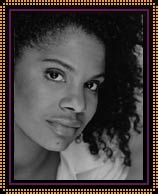 She’s stunning. She’s charming. But, in the end, with Audra McDonald, it’s the voice. She broke barriers when she was still “Audra Ann McDonald” by being cast as the second lead in the 1994 revival of “Carousel”; it amused critics to no end that a character named Carrie Snow was being played by a black woman. The production itself made no mention of her race; although she fainted in the middle of her audition, the director thought she was the best woman for the part. So, apparently, did the Tony nominating committee. She won the Best Featured Actress in a Musical in 1994, and then proceeded to win again two years later, this time for Featured Actress in a Play, “Master Class,” by Terrence McNally. Two years after that, she claimed yet a third Tony in the featured musical actress category for her work as the yearning young mother in “Ragtime,” playing opposite Brian Stokes Mitchell. No performer had ever won three Tonys in five years; she was still in her twenties.
She’s stunning. She’s charming. But, in the end, with Audra McDonald, it’s the voice. She broke barriers when she was still “Audra Ann McDonald” by being cast as the second lead in the 1994 revival of “Carousel”; it amused critics to no end that a character named Carrie Snow was being played by a black woman. The production itself made no mention of her race; although she fainted in the middle of her audition, the director thought she was the best woman for the part. So, apparently, did the Tony nominating committee. She won the Best Featured Actress in a Musical in 1994, and then proceeded to win again two years later, this time for Featured Actress in a Play, “Master Class,” by Terrence McNally. Two years after that, she claimed yet a third Tony in the featured musical actress category for her work as the yearning young mother in “Ragtime,” playing opposite Brian Stokes Mitchell. No performer had ever won three Tonys in five years; she was still in her twenties.
With Audra McDonald, it’s the voice.
Audra McDonald
Key Shows
- "Carousel"
- "Marie Christine"
- "Ragtime"
Related Artists
- Brian Stokes Mitchell
- Harold Prince
McDonald clearly needed a star vehicle, but after the failure of Michael John LaChiusa’s “Marie Christine” in 1999, she chose to devote herself to the concert stage and a series of recordings. Backed up by some of the finest symphony orchestras in the world, she has sung the roles of Bess, in “Porgy and Bess”; the Beggar Woman in “Sweeney Todd”; and Julie Jordan — the lead — in “Carousel.” Not content with mastering the works of Rodgers and Gershwin, she has turned her attention to the latest work of the new generation of musical composers: LaChiusa, Adam Guettel, Jeanine Tesori, Stephen Flaherty, and Lynn Ahrens. They could have no better ally than McDonald, who brings back the thrilling vocal virtuosity of the operetta era, marrying it to the psychological complexity of the 21st century. As Frank Rich put it, “The musical was dreamed up by artists eager to break free, to honor [the] old-world cultural past and yet transcend it, to create a new form as varied and exciting and of-the-moment as their new, melting pot country. In McDonald, the form has found a singer whose voice, history and still-young career embody all its contradictory joys.”
Source: Excerpted from BROADWAY: THE AMERICAN MUSICAL by Michael Kantor and Laurence Maslon. Published by Bulfinch Press.
Photo credits: Photofest
 She’s stunning. She’s charming. But, in the end, with Audra McDonald, it’s the voice. She broke barriers when she was still “Audra Ann McDonald” by being cast as the second lead in the 1994 revival of “Carousel”; it amused critics to no end that a character named Carrie Snow was being played by a black woman. The production itself made no mention of her race; although she fainted in the middle of her audition, the director thought she was the best woman for the part. So, apparently, did the Tony nominating committee. She won the Best Featured Actress in a Musical in 1994, and then proceeded to win again two years later, this time for Featured Actress in a Play, “Master Class,” by Terrence McNally. Two years after that, she claimed yet a third Tony in the featured musical actress category for her work as the yearning young mother in “Ragtime,” playing opposite Brian Stokes Mitchell. No performer had ever won three Tonys in five years; she was still in her twenties.
She’s stunning. She’s charming. But, in the end, with Audra McDonald, it’s the voice. She broke barriers when she was still “Audra Ann McDonald” by being cast as the second lead in the 1994 revival of “Carousel”; it amused critics to no end that a character named Carrie Snow was being played by a black woman. The production itself made no mention of her race; although she fainted in the middle of her audition, the director thought she was the best woman for the part. So, apparently, did the Tony nominating committee. She won the Best Featured Actress in a Musical in 1994, and then proceeded to win again two years later, this time for Featured Actress in a Play, “Master Class,” by Terrence McNally. Two years after that, she claimed yet a third Tony in the featured musical actress category for her work as the yearning young mother in “Ragtime,” playing opposite Brian Stokes Mitchell. No performer had ever won three Tonys in five years; she was still in her twenties.
